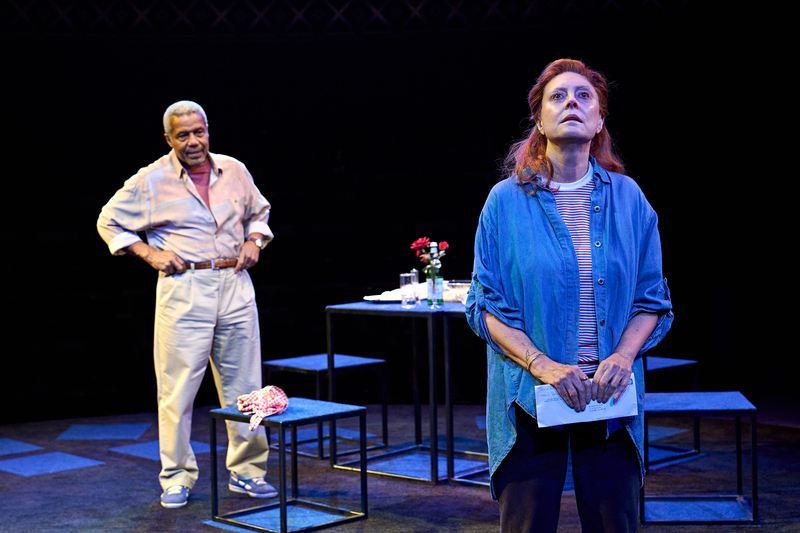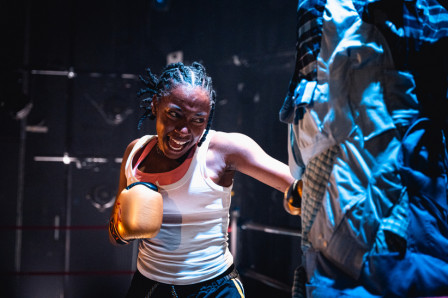Review: MARY PAGE MARLOWE at The Old Vic
Five actresses play MARY PAGE MARLOWE at various stages of her life and during key moments of her lived experience. The burning question is, why would we want to spend time getting to know her? The answer isn’t immediately obvious, nor even entirely clear by the end of Tracy Letts’ play, despite it bringing to life a hotch-potch of momentarily compelling scenes.
 Hugh Quarshie and Susan Sarandon in Mary Page Marlowe. Photo by Manuel Harlan
Hugh Quarshie and Susan Sarandon in Mary Page Marlowe. Photo by Manuel Harlan
Breaking the story into non-sequential and episodic elements from the outset, imbues a stylised disjointedness to proceedings in director Matthew Warchus’ production. The eschewing of chronology however, is intentional and not unto itself a reason to dislike the play. The device breaks things up into neat chunks of information as we are invited to dip into family moments, from which we gradually form a picture of a life lived and those milestones and individuals which proved significant in its living.
To begin with, we join Mary (at this point played by Andrea Riseborough) who is the parent designated (by her unseen husband) to tell the children about the impending separation and divorce. The kids are young enough to feel the unsettling trauma of this situation but while Wendy (Clare Hughes) flails angrily against the injustice of being wrenched out of high school in Dayton Ohio and dumped with the hicks down in Louisville Kentucky, her brother Louis (performed by Felix Anderson, Griffin Ashton and Dexter Pulling during the run) continues playing at the table, listening but largely not reacting. It is the first sign that this decision will impact his emotional development most significantly, and we later learn of his chronic drug dependency.
The destructive impact of alcohol addiction is a running theme through key sections of the play, rendering Mary’s father Ed (Noah Weatherby) disrespectful of the family unit and her mother Roberta (Eden Epstein) unthinkingly cruel and critical of young Mary (played by Alisha Weir as she rehearses a song to be performed at school). Ultimately, drinking destroys the first two of Mary’s three marriages, and results in a period of incarceration due to drunk driving. These vignettes are interspersed with an array of dark and angry interactions including the disintegration of her second marriage to salesman Ray (Paul Thornley) due to the impending jail term. Later we witness a pent-up Mary struggling to rationalise her feelings with an earnestly patient therapist (Lauren Ward).
It’s certainly not all gloom and doom however. There are lighter, affectionate moments throughout, as witnessed during a schoolgirl sleepover where Mary (Eleanor Worthington-Cox) receives a tarot reading delivered earnestly by Lorna (Danielle Arthur-Kennedy) and mocked mercilessly by Connie (Kingsley Morton). There’s a hotel tryst where Mary (played by Rosy McEwan) has a meaningless sexual experience with her office boss Dan (Ronan Raftery). There’s also a gently flirtatious episode at a dry-cleaning store where Mary (played by Susan Sarandon) discusses with Ben (Gilbert Kyem Jnr) the significance of panels on an old quilt, but the scene feels distinctly didactic and tacked-on. Later, we meet her in happier times having found love and companionship with her third husband Andy (Hugh Quarshie) and receiving palliative medical care from a nurse (Melanie La Barrie) towards her last days.
Played in the round on a set designed by Rob Howell, the aforementioned quilt is lit centre stage at the beginning and end of the show and serves as a metaphor for the transience of human life and its stories — particularly those of women. In presenting these human interactions, strengths and frailties, the piece certainly works, but I was left pondering whether it could potentially work more effectively as a movie. Tracy Letts is an actor who writes dialogue for fellow actors, but despite occasional frissons MARY PAGE MARLOWE ultimately lacks the simmering emotional intensity of his seminal work August: Osage County.
MARY PAGE MARLOWE runs 90 mins without interval and continues at the Old Vic until 1st November. This reviewer gives it a very solid 3 stars.
Latest News

 Full cast announced for London premiere of IN PIECES
26 February 2026 at 16:07
Full cast announced for London premiere of IN PIECES
26 February 2026 at 16:07

 DEATH NOTE THE MUSICAL to come to London's Barbican Theatre
26 February 2026 at 11:56
DEATH NOTE THE MUSICAL to come to London's Barbican Theatre
26 February 2026 at 11:56

 Review: BITCH BOXER at Arcola Theatre
26 February 2026 at 07:09
Review: BITCH BOXER at Arcola Theatre
26 February 2026 at 07:09

 Shakespeare Plays to Watch in London in 2026
25 February 2026 at 23:13
Shakespeare Plays to Watch in London in 2026
25 February 2026 at 23:13